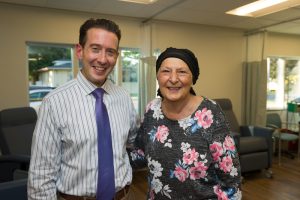
Early Signs of Inflammatory Breast Cancer
Regional Cancer Care Associates (RCCA) provides comprehensive treatment of cancer and blood disorders to patients throughout New Jersey, Connecticut, and the Washington, DC, area. Here,
HIPAA Alert: Potential Data Breach Learn More
Questions on Oncology, Hematology and/or Infusion Clinical Services due to COVID-19 Crisis – CALL 833-698-1623
Important Information for Our Patients Regarding the Coronavirus.
RCCA Providing Area Cancer Patients with Access to Care During Coronavirus Outbreak
RCCA Offering Patients Virtual Visits During Coronavirus Pandemic
Patients with breast cancer rely on their expert medical team to help them choose the treatment approach that is best for them. The experienced medical oncologists of Regional Cancer Care Associates, or RCCA, collaborate with one another and the patient to create comprehensive personalized treatment plans that reflect both the latest evidence-based approaches and the patient’s specific situation to obtain the best possible outcomes. With convenient locations in, New Jersey, Connecticut, and the Washington, D.C., area, RCCA then provides patients with cutting-edge cancer treatment, delivered by a team of compassionate healthcare professionals.
RCCA’s approach starts with formulating a personalized breast cancer treatment plan for each patient. Including the patient every step of the way, the medical team considers the following:
RCCA’s medical oncologists take all the time a patient needs to share her or his questions, preferences, and concerns, explain treatment options, and discuss the best course of action to treat the patient’s specific type of breast cancer. Patients frequently have several options, and more than one breast cancer treatment often will be used, either in succession or simultaneously.

Most patients with breast cancer undergo surgery as part of their treatment. The following types of breast cancer surgeries are most common:
Frequently used in the treatment of breast cancer, chemotherapy can be administered intravenously or via pills taken by mouth, with the type of chemotherapy prescribed determined by the nature of the patient’s cancer and other factors. Chemotherapy is used to kill cancer cells. While not all patients require chemotherapy, our doctors may recommend administering various chemotherapy drugs in the following ways:

These therapies may be prescribed to help prevent recurrence of breast cancers that are sensitive to hormones. These drugs prevent hormones such as estrogen and progesterone from driving the growth of cancer cells. Hormone therapies include tamoxifen, toremifene, fulvestrant, and s class of drugs called aromatase inhibitors.
In some cases, surgical removal of the ovaries is performed to remove this natural source of hormone production.
Immunotherapies, which harness the power of the body’s own immune defenses to fight cancer, also have come to play an increasing role in breast cancer in recent years, particularly in terms of high-risk early-stage breast cancer and breast cancer that has spread – or metastasized – to other areas of the body. Meanwhile, targeted therapies work to destroy or slow the growth of cancer cells that have specific proteins – which serve as targets for these drugs. Targeted therapies also have played a large role in breast cancer treatment in recent years.
Radiation therapies use energy to eliminate breast cancer cells. Typically used along with surgery and other approaches, radiation helps reduce the risk of recurrence. Two types of radiation therapy often are used to treat breast cancer:
Learn more about how RCCA’s oncology experts can answer your questions and help you determine the best options for breast cancer treatment. Regional Cancer Care Associates provides convenient, state-of-the-art treatments for cancer and blood disorders at 25 care centers in New Jersey, Connecticut, Massachusetts, and the Washington, D.C., area. Request an appointment at the location nearest you today.
A breast cancer diagnosis can be one of life’s most difficult experiences. But when it comes time to navigate your breast cancer treatment options, the team at Regional Cancer Care Associates will be right by your side. We guarantee you’ll receive a customized course of action that involves the most ideal combination of available treatments to ensure the best possible outcome. In addition, we’ll provide you with ongoing support and resources, such as nutrition counseling and psychiatric therapy, to help speed the healing process. For more information, contact us today.

Regional Cancer Care Associates (RCCA) provides comprehensive treatment of cancer and blood disorders to patients throughout New Jersey, Connecticut, and the Washington, DC, area. Here,

When people think of breast cancer, they generally think of it affecting women. However, in rare circumstances, breast cancer can affect men, most commonly in

First diagnosed with breast cancer in 1992, she has persevered in her battle against the disease for more than 30 years.

Regional Cancer Care Associates is one of fewer than 200 medical practices in the country selected to participate in the Oncology Care Model (OCM); a recent Medicare initiative aimed at improving care coordination and access to and quality of care for Medicare beneficiaries undergoing chemotherapy treatment.